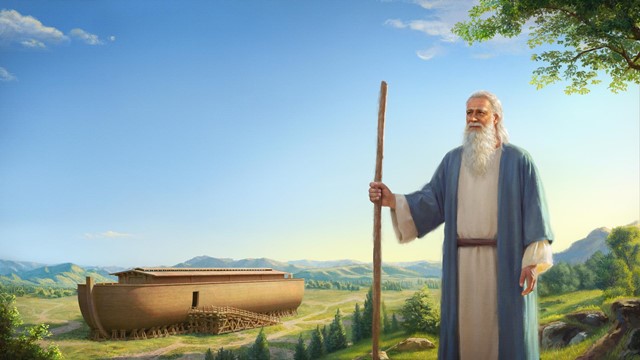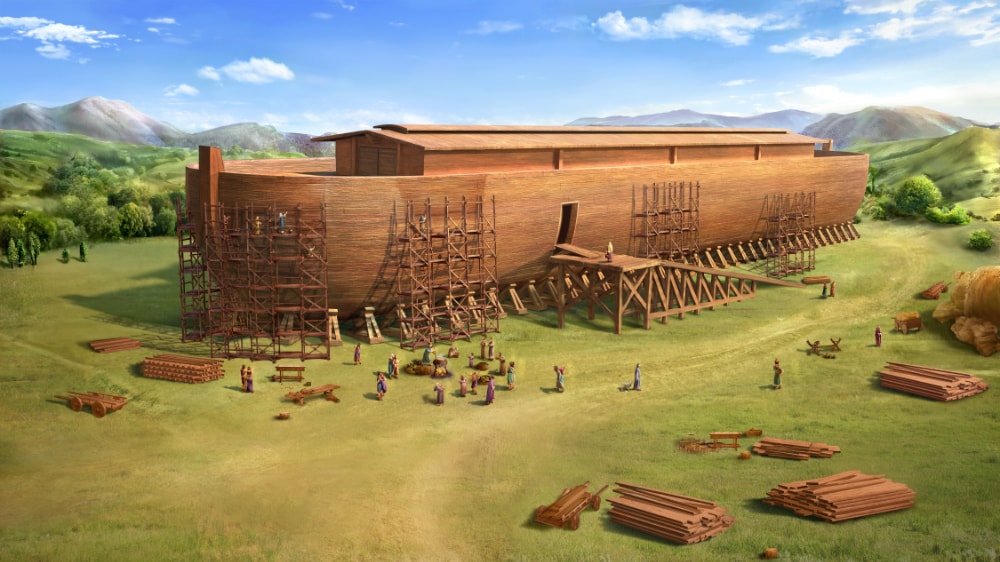What Is the Meaning of the Parable of the New Cloth and Old Garment?
One day, after a meeting, a sister asked me, “Brother, the Lord Jesus said, ‘No man puts a piece of a new garment on an old; if otherwise, then both the new makes a rent, and the piece that was taken out of the new agrees not with the old’ (Luke 5:36). Do you know what this parable means? What does the Lord want to tell us through it?”
Hearing the sister’s questions, I thought that I happened to have some understanding of this parable of the Lord Jesus, so I replied without thinking, “In the Old Testament, the Israelites were required to fast on the day of atonement every year. But as the salvation of the Lord Jesus had come, the old practices were no longer applicable, and people should abide by the new requirements proposed by the Lord. By telling this parable, the Lord Jesus warns us that in our faith in Him, we cannot cling only to the laws of the Old Testament like the Pharisees did, but instead should accept and follow the Lord’s words and act in accordance with His teachings.” Upon hearing my answer, the sister nodded her head, and I also felt gratified for my ability to understand the Lord’s will.
Just then, Co-worker Zhang, who had recently returned from another place, said, “Brother Wang, I used to think like you. But God’s words are the truth and contain deep meaning. A couple of days ago, I had a fellowship with a brother from another church on this verse. Through reading a book of truth, I gained some deeper understanding about the Lord’s will behind this parable. How about we fellowship together?”
Hearing that Brother Zhang had a deeper understanding and knowledge about this verse, I said happily, “That would be great!”
“Brother Zhang,” the sister anxiously cut in, “since you have a deeper understanding, please tell us about it!”
Brother Zhang smiled and said, “OK. Let me first read a passage that we read that day.” As he said this, he took a tablet out of his bag and read, “‘Because there are always new developments in God’s work, there is work that becomes obsolete and old as new work arises. These different types of work, old and new, are not contradictory, but complementary; each step follows from the last. Because there is new work, the old things must, of course, be eliminated. … The work of God is always new and never old; it never forms doctrine, instead changing continually and being renewed to a greater or lesser extent. Working in this way is an expression of the inherent disposition of God Himself. It is also the inherent principle of God’s work, and one of the means by which God accomplishes His management. If God did not work in this way, man would not change or be able to know God, and Satan would not be defeated. Thus, in His work, changes continually occur that appear erratic, but which are actually periodic’ (“Only Those Who Know the Work of God Today May Serve God”).
“From this passage we can see that God’s work does not follow rules, and that He performs new work in accordance with His plan for mankind’s salvation as well as according to the degree of mankind’s corruption by Satan. God’s work varies with the age and period, and is not everlasting and immutable, and He always does newer and higher work. When the new work begins, the previous work becomes out of date, and God embarks on another plan and carries out new work. For example, Jehovah God did the work of issuing laws and guiding the lives of people. Under the guidance of Jehovah God, the Israelites of the time learned how to conduct their lives and how to worship God, and understood what sin was. But in the later period of the Age of Law, as man was becoming more and more corrupted by Satan, no one was able to keep the laws and commandments any longer, and all were in constant danger of being sentenced to death by the law. In order to save mankind, God incarnated into the image of Jesus and, on the basis of the work of the Age of Law, did a stage of work of redeeming mankind through crucifixion. The Lord Jesus brought a new age, fulfilled the laws and commandments, gave people a new way to practice and proposed new requirements for them, such as being tolerant and patient, loving their enemies, being the light of the world and salt of the earth, and so on. From the outside, these two stages of work appear different, but they actually complement each other, through which God saves mankind from the influence of Satan step by step. From this we can see that God’s work does not remain unchanged, but rather is always moving forward, and that God’s requirements of mankind are becoming ever higher.
“The Pharisees back then, however, didn’t know God’s work. They abided by religious notions and used the laws of the Old Testament to examine the Lord Jesus’ new work and words. They said that the Lord Jesus sat at the table with tax collectors, and that He and His disciples had violated the laws by not keeping the Sabbath day and not fasting, thereby denying that the Lord Jesus was the Messiah. So when the Lord Jesus said, ‘No man puts a piece of a new garment on an old; if otherwise, then both the new makes a rent, and the piece that was taken out of the new agrees not with the old’ (Luke 5:36), He was telling people that God’s work is ever new and never old, that the work of redemption God ushered in was new, and that God wouldn’t do the new work and the old one simultaneously, for that would make it impossible for the new work to be carried out.”
After listening to the brother’s fellowship, my heart brightened considerably. I had read many spiritual books, but none of them explained God’s work so clearly. I said to Brother Zhang, “What you fellowshiped is truly something I have never understood. Do you have any other new understanding? Please share more with us.” After saying this, I anxiously waited for Brother Zhang to continue his fellowship.
Brother Zhang took a sip of water and continued, “We humans love to cling to the old, so when God performs new work, we are apt to be eliminated by the Holy Spirit for holding on to the old work. Therefore, we must understand that God only works on and leads those who are willing to let go of their old notions and who obey God’s new work. The book says, ‘People always cling to the old. They cling to the notions of the past, to everything from times gone by. This is a great obstacle to their service. If you cannot throw them off, these things will throttle your whole life. God will not commend you, not in the slightest, not even if you break your legs running or your back with labor, not even if you are martyred in your service of God. Quite the contrary: He will say that you are an evildoer.’ ‘Starting from today, God will formally perfect those who have no religious notions, who are willing to set aside their old selves, and who obey God in a simple-hearted way. He shall perfect those who long for the words of God. These people should stand up and serve God. In God there is endless abundance and boundless wisdom. His amazing work and precious words await enjoyment by even greater numbers of people’ (“Religious Service Must Be Purged”). These passages tell us that, because we humans have no truth or knowledge of God, we love to cling to the old and to God’s past work. This is especially true for those who have followed God and served Him for many years. When they have some experience in preaching and master some biblical knowledge and theological theories, they treat these things as capital and thus believe that they have known God’s work. However, once they cling to these things, it will be hard for them to accept God’s new work. Meanwhile, those who do not have old religious notions, who are able to obey in a simple-hearted way, and who can accept God’s new work and new words will obtain God’s salvation. Just like when the Lord Jesus came to do new work, those Pharisees, who had served God in the temple for many years and clung to old religious notions, thought that the Lord Jesus was not the Messiah foretold in the Bible because He looked very ordinary and came from a humble background. Especially when they saw that the work performed by the Lord Jesus was not recorded in the Old Testament of the Bible, they condemned and blasphemed Him, and in the end even nailed Him to the cross, thus suffering the pain of national subjugation. By contrast, those fishermen, publicans, harlots and sinners, when seeing that the Lord Jesus’ words were not things that people could express and that His work contained power and authority, were able to believe in and follow Him. Take Peter, Jacob, John and Matthew for example. When the Lord Jesus called out to them, they immediately gave up everything and followed Him, during which time they heard the truth expressed by the Lord Jesus, witnessed His authority and wonderful deeds, and recognized that the Lord Jesus was Christ, the coming Messiah, and in the end attained God’s salvation.”
After listening to the words that Brother Zhang read as well as his fellowship, the sister kept nodding her head, and I also felt that these were entirely new ideas. I said, “Brother Zhang, what you fellowshiped today really gave me a deeper understanding of this parable. Through this parable, the Lord Jesus tells us that God’s work is always new and never old, and that it is carried out based on the degree of mankind’s corruption. When people at the end of the age of the Old Testament could no longer uphold the laws, God performed a new work to save mankind based on this situation. If God begins new work but we cling to our old notions and use His previous work to measure the new one, then it will be hard for us to accept God’s new work.”
Brother Zhang said, “It’s true. We are now in the last days, the prophecies of the Lord’s return have basically been fulfilled, and the Lord is about to return at any time. According to the prophecies in the Book of Revelation, God will perform the work of opening the little scroll, loosing the seven seals, separating the goats from the sheep, the wheat from the tares, and the good servants from the wicked servants, and perfecting a group of overcomers. However, this is just briefly mentioned in the Book of Revelation but is not recorded in detail, so none of us know how God will specifically fulfill and accomplish all this. In light of this, when the Lord Jesus returns to work in the last days, we should be like the wise virgins and open the door to actively welcome Him, be someone who thirsts for and seeks the truth, and investigate any message about the new work done by the returned Lord to see whether it is from God. Only in this way can we have the opportunity to welcome the Lord and gain God’s salvation of the last days.”
Hearing what the brother said, my heart felt very bright and I said, “Yes, you’re right. The Book of Revelation only prophesies that the Lord will come to work and save mankind in the last days, but none of us can perceive how the Lord will do this work when He returns. This is because God’s work is too wise and unfathomable. But no matter what, as long as the Lord comes back to do new work, we must go out to welcome Him just like Peter, Matthew and the others walked out of the temple to investigate the Lord’s work. This is the only way we can attain the Lord’s salvation. After listening to your fellowship today, I understand a lot more about the parable told by the Lord Jesus. Thanks be to the Lord! Brother Zhang, this book is very good because it can help us know God’s work and understand His will. Could I borrow it to read?”
Brother Zhang agreed right away …





